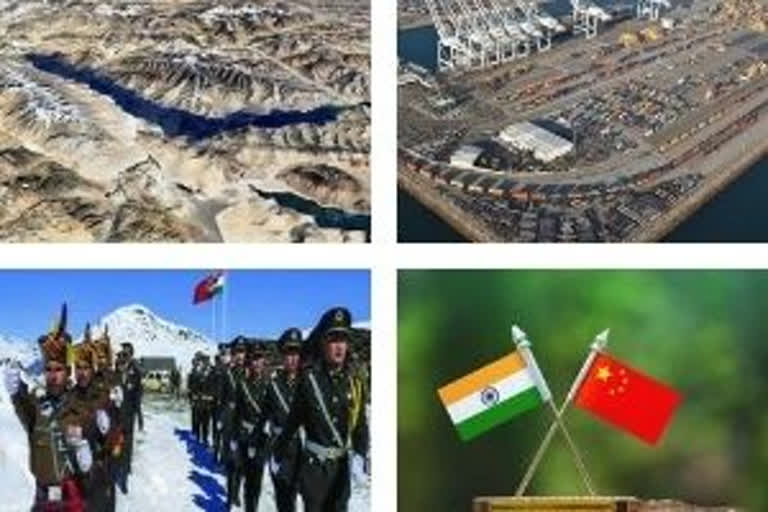New Delhi: To expand its market base in the energy-rich central Asian countries, India has always been eager to explore shortest trade routes to these destinations.
In this scheme of things, Iran appeared to be a natural partner, given its geographical position. The trade relations between the two through the Chahabar Port would enable India to enhance its trade links with central Asian nations. For which India wanted to establish a trade route with Afghanistan bypassing Pakistan, which was possible only through Chahabar, as Iran and Afghanistan are connected to each other through a landroute. Iran and India, on the other hand, have sea and air connectivity only.
Afghanistan, a landlocked nation, mostly dependent on Pakistan for exporting goods. It also wanted to reduce its dependence on Pakistan by establishing diverse trade routes. But their hunt for alternate trade routes ended with the death of Qassem Soleimani, the legendary Iranian general popular in Afghanistan’s northern regions and the leader of Quds Force, the foreign military wing of the elite Islamic Revolutionary Guards (IRG).
Soleimani had played a role in building trade relations among the three countries through the port. He was highly popular among Hazaras, the shiite Afghan minority, which potentially made him the man who could persuade the Afghan leadership to join hands with Iran and India. "Qassem was the man who actually designed and implemented the plan and brought the three countries together," said Iranian envoy and Consul General of Iran in Hyderabad, Mohammad Haghbin Ghomi to this author.
Also read: Indian Army's challenges in Ladakh where logistics hold the key
The IRG, a group proscribed by the US, was a dilemma for India. Any proximity with it would have spoiled relations with the US. Qassem’s involvement in trade-related developments was very low-key. Chabahar Port, which is hardly 68 kilometers from Pakistan’s Gawadhar Port, is situated in the Sistan province. It was the main attraction for the Afghan government as the agreement between the three countries--- India, Iran and Afghanistan---allowed Afghanistan to use the port against a minimal amount to be paid to India. The port gives India access to Afghanistan and to other Central Asian nations bypassing Pakistan.
It also reduces Pakistan’s economic importance for Afghanistan by allowing it’s goods to move through an alternate route. A decade ago, road connectivity was established between Chabahar to Afghanistan, which connects it with Herat and Kandhar in the south of the country. The road also connects Kabul and northern part of the country that is dominated by Hazaras. The rail link, India planned to construct from Chabahar to Afghanistan would have benefited Afghanistan, Iran and India equally had the construction work started on time.
India’s shortest route to Central Asia is via Chabahar-Afghanistan. Iran and India signed an agreement around four years ago to have a rail link between Chahabar to Zahedan, but it never took off. In fact, Indian construction agency, IRCON, as per the agreement, would be responsible for its entire construction project. The problems started when Iran wanted one of its companies as part of the project. It was untenable for India to accept the proposal because the company Iran recommended had links with the IRG (Islamic Revolutionary gaurds), an unpopular force for USA.
Suleimani, who played a key role in bringing Afghanistan and Iran closer, was killed by US forces in a drone attack on January 3rd this year in Iraq. His killing stalled the Chabahar-Zahedan rail project. India developed cold feet because it didn't want to be seen as an ally of Iran as that would have annoyed the more important ally, the US.
In the context of Iran, India follows the policy of "engaging with all but allying with none". But this strategic move came with a huge cost for India as it’s adversary China has reportedly made a secret deal with Iran over the construction of a rail line between the port and Afghanistan.
Also read: JK theatrics: Exit the bureaucrat, enter the politician
Haghbin Ghomi denies that "China will be steering the railway project and says all activities related to it are its own." Iran is claiming that it will incur its own resources in the Chahabar Zahedan rail line.
China’s investment through BRI (Border Roads Initiative) in the CPEC (China Pakistan Economic Corridor) for its uninterrupted all weather routes to international market through Gawadhar Port is one of China's key economic routes that could have been challenged had the Chabahar-Zahedan rail project with India's support come to fruition.
In American sanctions on Iran, Beijing saw an opportunity to partner with the beleaguered Gulf nation. China has announced an investment of 400 billion US dollars over the next 25 years, though the deal is yet to be made formally. India’s reluctance to defy the US policy towards Iran provided China with an opportunity to step in. Now it is for India to make a strategic move which not only deters China to enter into the deal with Iran but conveniently makes India’s reentry into energy rich gulf region without annoying the USA. The wisdom has to prevail against the treacherous China.



